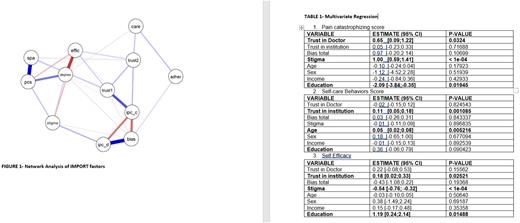Abstract
Background: Sickle cell disease (SCD) causes significant morbidity across the lifespan. Finding ways to manage the most common and debilitating complications, including chronic pain, is of utmost importance to restoring quality of life and decreasing health care utilization. Several studies have estimated that chronic daily pain affects 30-50% of adult patients with SCD (1) (2). Furthermore, in both pediatric and adult patients with SCD, those with more frequent chronic pain report more frequent depressive symptoms, more frequent hospital admission, and more significant functional disability (2) (3). Discrimination is associated with poor mental health and decreased self-efficacy. The Improving Patient Outcomes with Respect and Trust (IMPORT) study demonstrates that patients with SCD report higher rates of race-based discrimination compared to other Black patients (10). Disease-based discrimination was associated with more significant self-reported pain. Because virtually all patients with SCD identify as Black or other racial and ethnic minorities, it is important to understand how discrimination as experiences of bias, racism, and disease-related stigma interact to affect health and functioning. This study explores the relationship between SCD stigma, self-efficacy, and other factors in the IMPORT data set.
Methods: We first analyzed the relationship between variables including trust in doctor (trust1), institutional trust (trust2), and depressive symptoms (depress) with a network analysis (NA). The weighted partial correlation network structure of these factors and self-care (care), self-efficacy (effic), bias, interpersonal communication-compassionate(ipc_c) and discrimination (ipc_d), pain attitudes (spa) and pain catastrophizing score (pcs) among SCD patients is shown in the figure (n= 245). The stronger a connection between two nodes, the thicker and more saturated the line. Positive and negative connections are denoted by blue and red edges, respectively.
After identifying significant relationships by NA, Additional analysis explored the effect of provider and institution trust, perception of bias and stigma on pain catastrophizing score, self-care, and self-efficacy. We fit multivariable linear regression models of the three outcomes (pain catastrophizing score, self-care, and self-efficacy) with trust, perception, and stigma as covariates. We further adjusted for age, sex, income category, and education level in the regression models.
Results:Figure 1- Network analysisTable 1- Multivariate Regression Model Trust in doctors, stigma and education level were significantly associated with the PCS score. Each unit increase in stigma was associated with increase in the PCS score by 1 (p<0.001). The higher the education level, the lower the PCS. Increase in trust in doctors was associated with increased PCS score.
Trust in institutions and age were significantly associated with self-care behaviors. Higher trust in institution is associated with higher self-care. Also, older age is associated with increased self-care.
Trust in institution and education level are positively associated with self-efficacy. Stigma is negatively associated with self-efficacy.
Discussion: This novel analysis of self-efficacy and experiences of stigma in adults with SCD reveals a significant association between sigma and self-efficacy. Additionally, our network analysis demonstrates the centrality of self-efficacy and pain catastrophizing, 2 promising targets for future intervention. The centrality of compassionate interpersonal communication also underscores the importance of the bidirectional relationship between patients and clinicians.
Disclosures
Guarino:Novartis: Consultancy. Lanzkron:Pfizer: Consultancy, Current equity holder in private company; Novo Nordisk: Other: Adjudication committee; bluebird bio: Other: Adjudication committee, Research Funding; Novartis: Consultancy, Research Funding; Glycomimetics: Consultancy; Imara: Research Funding; GBT: Research Funding; Novartis: Research Funding; Takeda: Research Funding; CSL-behring: Research Funding; HRSA: Research Funding; PCORI: Research Funding; Teva: Current equity holder in private company.
Author notes
Asterisk with author names denotes non-ASH members.


This feature is available to Subscribers Only
Sign In or Create an Account Close Modal